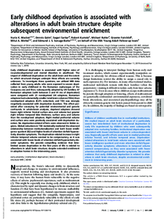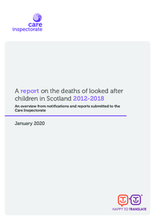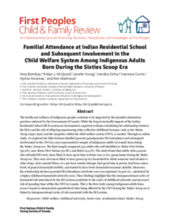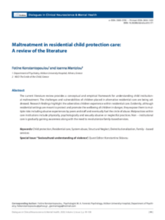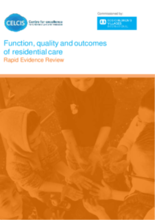Displaying 331 - 340 of 1510
The purpose of the study was to evaluate the associations between child maltreatment, cognitive schemas of disconnection/rejection reported in emerging adulthood, and social support perceived in emerging adulthood among young women who have exited placements in residential care.
In the current study, the authors identify specific child protective service experiences and mental and behavioral health characteristics that are predictive of moving from a family based foster placement to a congregate care placement.
This study examines the link between perceived staff social support and emotional and behavioral adjustment difficulties of adolescents in educational residential care settings (RCSs) designed for youth from underprivileged backgrounds in Israel.
For this study, a sample of 365 adolescents in residential care settings in Portugal completed a set of self-reported measures, specifically, the Rights perceptions scale, the Place attachment scale and Scales of psychological well-being.
To investigate the impact of childhood deprivation on the adult brain and the extent to which structural changes underpin these effects, the authors of this study from PNAS utilized MRI data collected from young adults who were exposed to severe deprivation in early childhood in the Romanian orphanages of the Ceaușescu era and then, subsequently adopted by UK families.
This report draws attention to themes emerging from notifications of the deaths of 61 care experienced children and young people over seven years from 2012 to 2018.
This report from Save the Children Norway explores what child welfare institutions in Norway are doing to protect children in their care from the risk of online sexual offences.
Through an online study, the authors of this paper explored the links between familial (parents/grandparents) Indian Residential School (IRS) attendance and subsequent involvement in the child welfare system (CWS) in a non-representative sample of Indigenous adults in Canada born during the Sixties Scoop era.
The current literature review provides a conceptual and empirical framework for understanding child institutional maltreatment.
This review seeks to provide an overview of the existing research on residential care, including the function of residential care, what facilitates 'quality' care in residential care, and what effect residential care has upon outcomes for children and young people.

